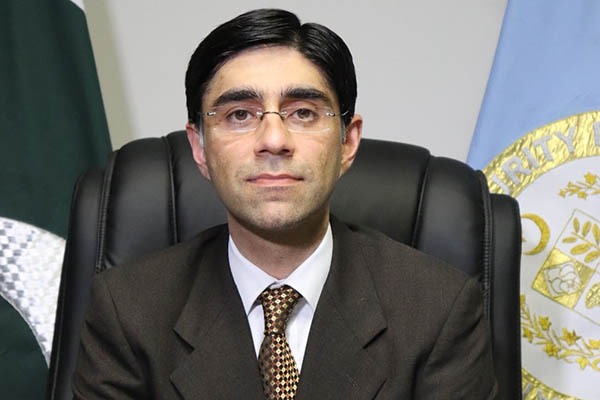
National Security Adviser Moeed Yusuf. Photo courtesy Islamabad Policy Research Institute
NSA stresses that engaging with Taliban regime will enable foreign states to directly demand the group fulfill pledges for women’s rights, inclusive government
National Security Adviser Moeed Yusuf on Wednesday warned that the global stance of waiting to see whether or not the Taliban would fulfill their pledges to uphold human rights and curb terrorism before recognizing their regime risked a total collapse of Afghanistan.
“It may be popular to talk about ‘wait and see,’ but wait and see essentially means a collapse,” he told journalists at a press conference in Islamabad. “Humanitarian assistance is … a stop-gap arrangement to ensure there is no immediate humanitarian crisis; that does not equate to governance, institutional and economic support, which is needed by any country to survive in the conditions that you find [in] Afghanistan,” he said, and reiterated concerns that isolating Afghanistan risked encouraging the same elements that the world wanted to eradicate.
“If abandonment happens there would be a security vacuum [in Afghanistan]. You already know ISIS is present there, Pakistani Taliban are there, Al Qaeda is there. Why do we risk a security vacuum?” he said, adding that the West had made the same mistake in the 1990s. The world’s abandonment of Afghanistan after the Soviet exit, he stressed, had led to economic collapse, civil war, and international terrorism. Western leaders had acknowledged their mistake and pledged not to repeat it, he recalled.
Afghanistan’s economy has been heavily reliant on foreign assistance and has been edging toward collapse since the Taliban’s Aug. 15 takeover because most donors have frozen or blocked access to assets under their control. Pakistan has repeatedly urged the global community to abandon this position, claiming that recognizing the Taliban would prove more beneficial as it would incentivize the group to fulfill pledges to ensure women’s rights and establish an inclusive government.
To a question, the NSA said that Pakistan, solely, did not have the resources to meet the Taliban government’s needs. Nor, he stressed, could Islamabad grant legitimacy to the regime without West support. He noted that several Western nations had remained engaged with the Taliban until their takeover of Kabul, adding that this engagement had led to the Doha agreement and helped the evacuation of foreign nationals from Afghanistan after the fall of Ashraf Ghani’s government.
“If the world is interested in this conversation, it needs to happen directly with the new government. For influencing and molding governance in the way the world wants, it should have conversation with them. Without engagement that would not be possible,” he said.
Pak-U.S. ties
To a question on ties between Washington and Islamabad, Yusuf said Pakistan had continuously advocated for a political settlement to the conflict in Afghanistan, adding that a military solution was not possible. He said that Washington’s recent hints of seeking a “reassessment” of its relationship with Pakistan should incorporate its dismissal of Pakistan’s earlier advice, as well as its calls to engage with the Taliban.
“If there has to be a reassessment, the reassessment has to conclude that what Pakistan was saying made sense. So now what Pakistan is saying [about Afghanistan] we should give a fair hearing to,” he said.
On Monday, U.S. Secretary of State told Congress that Washington would be reassessing its relationship with Pakistan in the coming days and weeks, adding that the U.S. wished to communicate what future role it would like Islamabad to play in the region.
